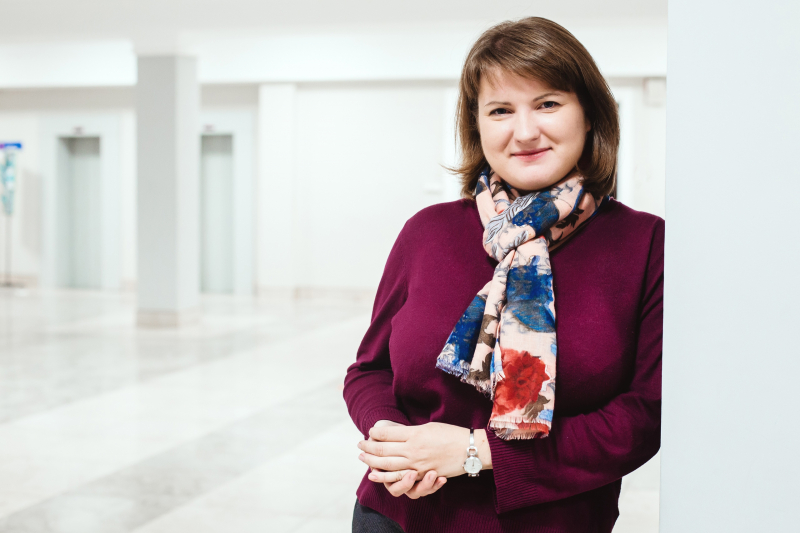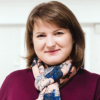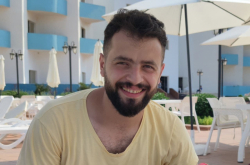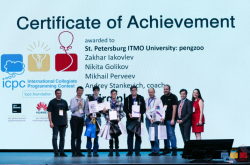Anastasia, could you tell us more about the competition and why you decided to join?
This contest aims to present the success stories of women who not only have successful careers but also share their own philosophy, their mission with the world. This is a place for women to talk about themselves and their goals, as well as build their personal brands.
When I first came across this award, I thought that it is an admirable project but it has nothing to do with me, however, later my colleagues reassured me. I consider myself a happy woman who has both the capacity and skills to combine science, teaching, business, and, most importantly, family. I’m eager to call attention to teaching and enhance the prestige of this profession. The teacher seeks to encourage students to make scientific breakthroughs. This is the key idea I managed to convey to the jury during the interview. And that’s how I earned a nomination for the Top Women award.
Were you surprised when you were selected?
Among the nominees are wonderful women who have their own businesses, social media accounts with a large following, international awards, and diplomas. Yet I have different achievements in the number of Master’s graduates, publications in scientific journals, and developed online courses. And, of course, I didn’t expect that the competition’s organizers would be so interested in my attitude to science, business, and life in general – and, above all, the idea I promote to the public.
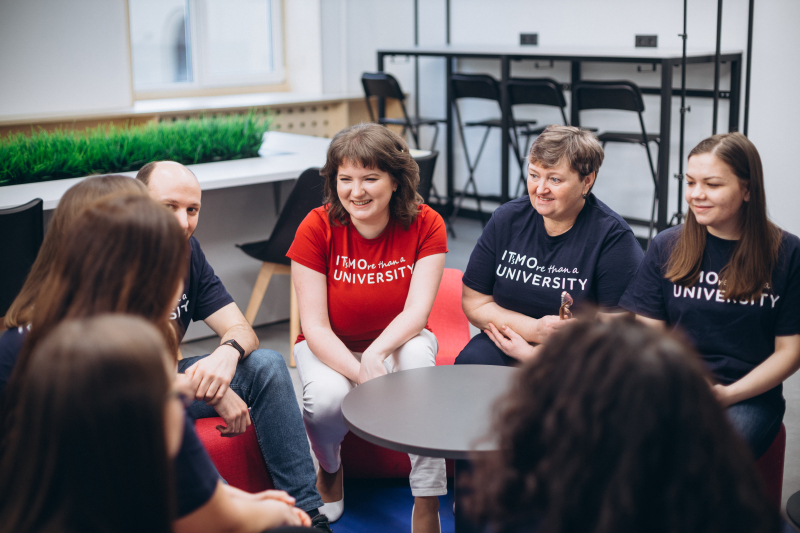
What is the idea?
I strive to increase the prestige of the teaching profession so that people would be proud to say that they are teachers, lecturers, or researchers. After all, working in a university is considered to be a path for those who didn’t succeed in their profession. But that’s not true. In fact, teaching is not easy, and our goal is to motivate teachers and promote the prestige of their careers.
Once I wondered, what our role is in today’s world: are we teachers, gurus, or maybe mentors? Or specialists providing educational services? It’s high time to admit that our views have shifted. Now, we have student-centered education, and students themselves create their learning tracks and programs, choose courses, the format of training, and even teachers.
This results in greater demands on teachers of today. It’s no longer enough to master the theory, the teacher has to demonstrate their expertise, their experiences, and practical knowledge.
I have been juggling work in my profession with teaching for 14 years. During the day, I am a quality assurance manager and in the evening, I explain the development process of eco-management and quality management systems to students. Moreover, I encourage my colleagues to share their knowledge and experiences with the younger generation, and many of them are happy to present their professional opinions. I believe that my life philosophy will facilitate the transfer of knowledge between business and science, as well as promote teaching professions.
You’re one of the nominees for the award. What will happen next?
A lot has happened already! Before announcing my nomination, I had to go on a little quest. One of the interesting tasks was to undergo an interview where I got to talk about female power and the importance of personal brand. This gave me a lot to think about.
The organizers throw a special photoshoot for the award. There, stylists tried to emphasize the uniqueness of each participant. When asked about my image, I knew for sure that I didn’t want to have a traditional look of a teacher as I strive to dispel stereotypes about women in education and science.
But the most exciting stuff is still ahead. Since March 16, there is online voting available, which will run till April 16. And those who share my mission and values can vote for me on the official website of the award in the Consulting, Education, and Business Training category.
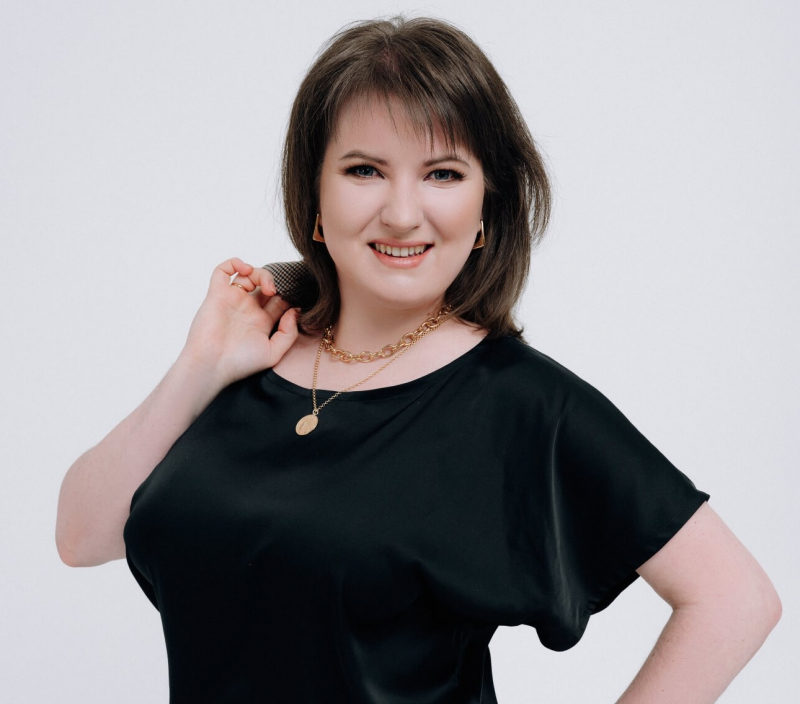
Women in science and business
Such competitions aim to highlight the role of women in science, business, and economics. This is also a platform for discussing discrimination and issues that women face when building their careers. How difficult is it for women to pursue their professional goals?
I can’t say that the fact that I am a woman complicates my career. However, it takes a lot of effort to balance science, business, and family, without forgetting that I am also a wife and a mother. However, I’m lucky to have great support from my family and an opportunity to develop further.
And what about your friends or colleagues? Do they face such difficulties?
Not that I know of. But it seems that women have more on their plate: not only we have to be smart but also beautiful.
You did your internships in the US and Europe. Could you say where this problem is more acute?
I first thought about this question in 2018 during my internship in Italy. The University of Bologna actively promotes equality and tolerance. My professor and supervisor Alessandra Bonoli believes that few women work in science, especially in engineering. There are only two women professors at their faculty. And, besides, it’s harder for women to get an engineering degree. That’s why the university initiated several projects to attract women to science and help them develop and promote in the field.
And what can you say about Russia?
Well, there are not so many men in ecology. 80% of the students in the Industrial Ecology major are women. So, I can’t really talk about the discrimination against women in science.
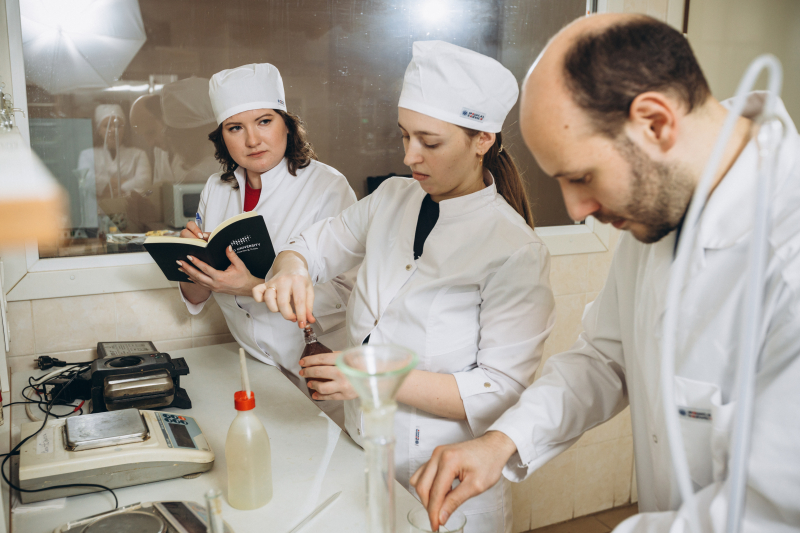
Teaching today
Could you tell us more about your path in science and education?
I started teaching as a PhD student during my practical training. Although my specialization is environmental engineering, teaching is my true passion. For 14 years, I’ve been sharing my knowledge with students in the field of environmental management, eco-certification, and circular economy. It gives me room for creativity and development. I’m thankful for all opportunities that ITMO offers to its students and staff. Thanks to mobility programs, I was able to do internships at the University of York in the UK and Boston University in the US. After completing the EMI course, I’m confident in teaching international students. Supported by the university, I received an award from the Government of St. Petersburg in the field of scientific and pedagogical activity in 2019. I like that life at the university is in full swing, and new projects and challenges inspire me.
As far as I know, you keep in touch with your students and those interested in your specialization via social media, including Instagram. How was distance learning for you?
2020 gave a great impetus to the growth and the introduction of innovative approaches in education. The fact that both young people and older people only are so active on social media made me think that it’s a great platform for education. And I was impressed by its opportunities. At the beginning of the academic year, I created a professional account on Instagram where I talk about management and the protection of the environment. My students supported me from the very beginning. Their reactions, comments, and responses to the proposed tasks showed great engagement in the educational process and interest in the subject.
Moreover, I also managed to attract a wider audience to the questions of environmental education. The so-called Accidental & Serendipitous Learning took place for all visitors of my profile, and in March, coverage reached 1,000 people.
Furthermore, it’s interesting to observe the integration and transfer of knowledge between science and business as some of my followers are colleagues from various organizations and industrial enterprises. They leave their comments, go live with me to talk about how ecologists work and what tasks chemical technologists perform at food enterprises. So, for me, 2020 wasn’t a year of crisis but opportunities.
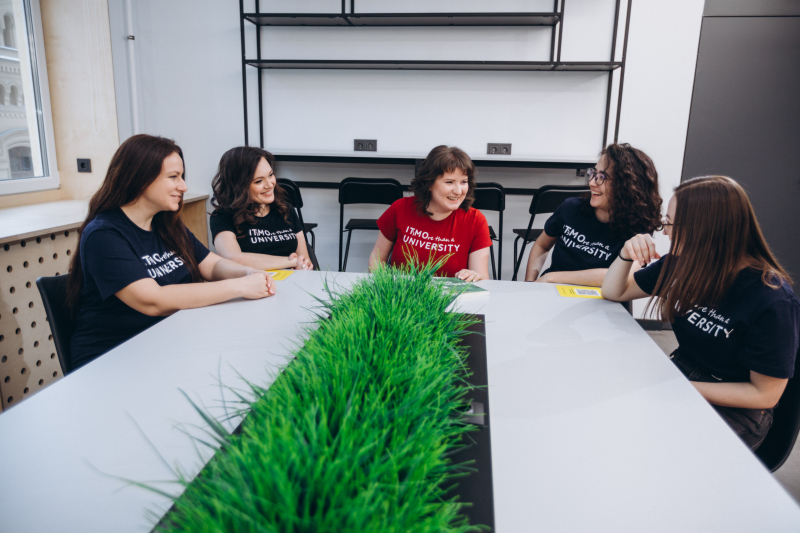
What is the difference between teachers in classrooms and scientific communicators on social media?
I see social media as an extra tool, an opportunity to engage students in the educational process. Today, there are numerous online courses, and all information can be found online. An opportunity to talk to your lecturer directly is somewhat of a privilege, a key advantage.
What are your professional plans?
First and foremost, I want to win the competition and become the Top Woman 2020. So, I really count on the support of my students and colleagues. I’m also going to continue working on my project on learning via Instagram. This year, I became a supervisor, and this is an enormous responsibility. And, of course, I still want to become a DSc.
